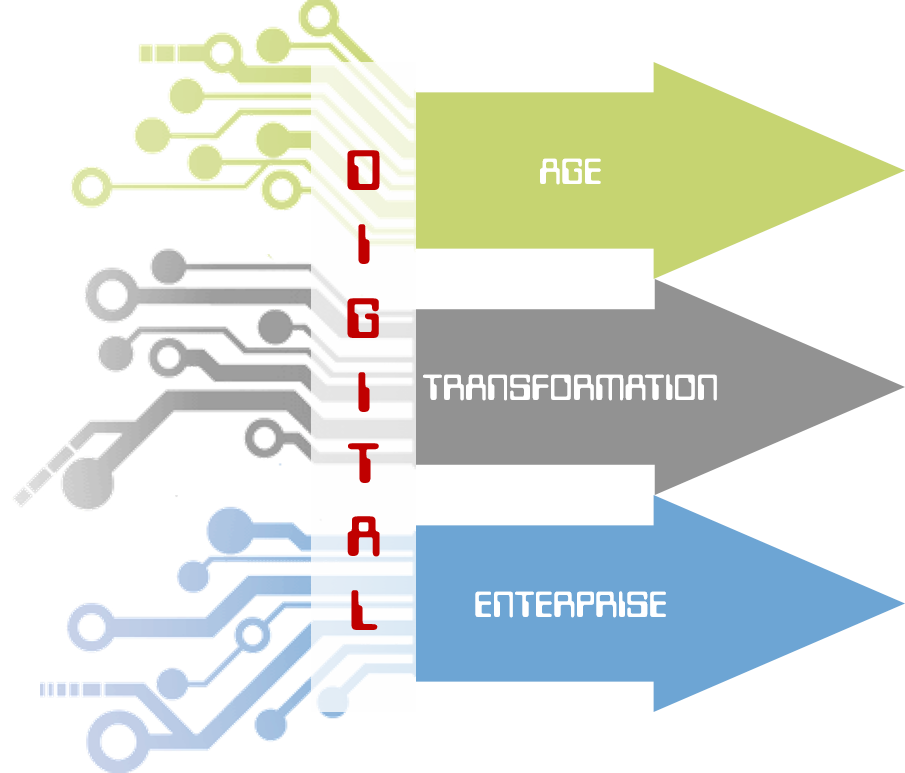Twenty-five hundred years ago the philosopher Heraclitus, wrote, “The only thing that is constant is change.” It’s a lesson the business world constantly learns even as some sectors resist change. The most apparent changes today have to do with digitization. There is no denying we live in the digital age and the lifeblood of the age is data. That’s why so many consultants insist businesses organized during the industrial age need to transform into digital enterprises if they want to survive. Some skeptics believe digital transformation is simply a meaningless buzzword; but, most subject matter experts think otherwise. For example, Neil Strother (@neilstrother), an associate director in Navigant’s energy practice, writes, “Digital transformation is a catchy phrase in corporate circles these days, but it turns out to be more than just hype. Numerous enterprises, both small and large, have embarked on journeys to transform their business processes using digital tools. Many cases of transformation have had successful results, with solutions to enable problem solving and also drive efficiency and monetary gains.”[1]
What is digital transformation?
While that may seem like a straight forward question, there is no easy answer. Fundamentally, digital transformation involves an enterprise leveraging data in order to improve efficiency and effectiveness. Kurt Cagle (@kurt_cagle), founder and Principal Consultant at Semantical, LLC, provides the following definition of digital transformation:[2]
“Organizations run on data, and in the twenty-first century, your organization needs to be able to take advantage of all of that data to remain competitive in the marketplace. By transforming your company to work more digitally, all of that data can be leveraged to gain a deeper understanding of customers, markets, competitors and trends. This digital transformation is something that every company needs to do to not only survive but thrive in the new economy.”
What digital transformation looks like differs depending on the economic sector in which the enterprise functions. It can even look different in companies engaged in the same economic sector. Cagle explains, “Digital transformations are far from trivial to undertake, in great part because it requires changing both infrastructure and culture within an organization, in part because most managers, especially at the middle tiers of an organization, recognize that such a digital transformation may very well result in them having less control, rather than more, of their particular divisions, and in part because most managers tend to have a rather dated view of data and information within their purview that leaves them with a number of misconceptions about what creating a fully digitally transformed company looks like.” Digitization affects the entire business from procurement to operations to sales to customer service. As Austin Gresham, a senior consultant for IT transformation at RoundTower consulting, states, “Transformation should not be an IT project. It’s not even a project. It’s literally a transformation of your business.”[3]
Digital transformation is an imperative for survival in the digital age; but, as Cagle notes, transforming is not easy. Ben Lamm reports, “Earlier this year, a study commissioned by Dell EMC and Intel revealed that only 6% of companies have ‘fully transformed’ as a result of their digital transformation efforts. According to the research conducted by ESG group, most companies were still emerging (45%) or evolving (43%) in their transformation efforts.”[4] Analysts from Embark note, “Technology is already redefining traditional roles throughout the industry to match the dynamic, evolving nature of the marketplace and customer expectations. For any company still sitting on the digital fence, a quick look at just a few of the ways technology is transforming the industry should serve as a much-needed wakeup call.”[5] Although they are specifically referring to the financial industry, their observation has broader applicability. If your company is sitting on the fence, Lamm believes you’ve already missed your opportunity to transform. He asks, “How are they going to compete with the most advanced 6% of businesses at a time when there are baked-in, structural advantages for leaders? Who do they think they’re going to outsmart when they can’t even figure out how to host an application in the cloud? Perhaps most importantly, how are they going to compete with the advanced 6% when those companies are already embarking on the next great transformation? We need to admit to ourselves that the age of digital transformation is over, and the intelligence transformation has begun.”
Beginning the digital transformation journey
While I agree with Lamm that early transformers have a distinct advantage, I’m more sanguine that fence sitters still have an opportunity to transform and thrive. Although Embark analysts point to how technology is changing the business environment, Cagle insists strategy is more important than technology at the beginning of the transformation journey. He explains, “[Machine learning, artificial intelligence, the Internet of Things, and other technologies] are certainly factors in enterprise digitalization, tools that reduce your reliance upon purely human curators, but its important to understand that none of those things by themselves are going to be as important long term as gaining control of your overall data strategy.” It’s a case of, “If you don’t know where you are going, you’ll never get there.” The conversation Alice had with the Cheshire Cat in Lewis Carroll’s Alice in Wonderland sums up this principle pretty well:
“Would you tell me, please, which way I ought to go from here?”
“That depends a good deal on where you want to get to,” said the Cat.
“I don’t much care where—” said Alice.
“Then it doesn’t matter which way you go,” said the Cat.
“—so long as I get SOMEWHERE,” Alice added as an explanation.
“Oh, you’re sure to do that,” said the Cat, “if you only walk long enough.”
Organizations won’t successfully transform if they just want to “digitize” without identifying specific goals and then generating strategies that will help them achieve those goals. Once strategies are in place, enterprises will find the technologies mentioned by Cagle are essential tools in the transformation process.
Concluding thoughts
MIT analysts note, “Across industries, for companies large and small, vast new data streams are now the guiding force behind new revenue opportunities and the catalyst for dramatic operational makeovers.”[6] They add, “Used strategically, an organization’s data gains value over time. But to unlock its potential requires first establishing the right technical and cultural foundations.” Gresham asks, “If you were starting with a clean slate, would you create the same company and operate the same way you did 10 (or 30) years ago? If the answer is yes, you’re either not digging deep enough, or you are lying to yourself. You’ve got to find people who are willing to change. There are companies that say that they’re transforming, but all that they’re doing is changing the window dressing on the house. They’re not changing the foundation.” To transform means to radically change from one state to another. Contemplating transformation can be frightening for companies that have been successful for decades. But most analysts believe digital transformation is an imperative. MIT analysts conclude, “While there’s no question that big data is the key to business success in the analytics-driven future, the sheer volume of data collected is not the defining competitive differentiator — rather, it’s what companies do with that data that determines whether they win or lose.”
Footnotes
[1] Neil Strother, “Yes, You Can Get Beyond the Hype of Digital Transformation,” Forbes, 11 January 2019.
[2] Kurt Cagle, “Why Most Digital Transformations Will Fail,” Forbes, 7 January 2019.
[3] Kent Bernhard, “Digital transformation really means business transformation,” Nashville Business Journal, 3 January 2019.
[4] Ben Lamm, “It’s definitely too late for your digital transformation,” CIO Dive, 14 January 2019.
[5] Embark, “5 ways digital transformation is changing enterprise for the better,” Dallas Business Journal, 8 January 2019.
[6] Staff, “From innovation to monetization: The economics of data-driven transformation,” MIT Technology Review, 7 January 2019.





